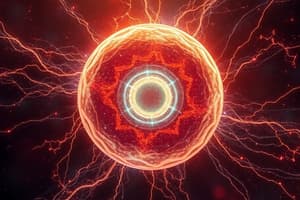Podcast
Questions and Answers
What type of particles are alpha particles?
What type of particles are alpha particles?
- Neutrons
- Protons
- Electrons
- Helium nuclei (correct)
Under what conditions do alpha emissions typically occur?
Under what conditions do alpha emissions typically occur?
- When the nucleus has too much energy
- In small atoms with low atomic numbers
- When the ratio of neutrons to protons is too high
- When the ratio of neutrons to protons is too low (correct)
What are beta particles composed of?
What are beta particles composed of?
- Alpha particles
- Protons
- Electrons (correct)
- Neutrons
When does beta particle emission occur?
When does beta particle emission occur?
What are gamma rays?
What are gamma rays?
When does gamma ray emission typically occur?
When does gamma ray emission typically occur?
Which type of radiation can be easily absorbed by a human hand?
Which type of radiation can be easily absorbed by a human hand?
Which type of radiation will be easily stopped by a concrete block?
Which type of radiation will be easily stopped by a concrete block?
What happens when an unstable nucleus emits radiation?
What happens when an unstable nucleus emits radiation?
How many out of 3000 known nuclides are stable?
How many out of 3000 known nuclides are stable?
What is the process called when an unstable nucleus transforms into a more stable nuclide?
What is the process called when an unstable nucleus transforms into a more stable nuclide?
Which type of radiation has the least ionizing ability?
Which type of radiation has the least ionizing ability?
Which type of radiation can penetrate several centimeters of aluminum?
Which type of radiation can penetrate several centimeters of aluminum?
Among alpha, beta, and gamma radiations, which one ionizes air most strongly?
Among alpha, beta, and gamma radiations, which one ionizes air most strongly?
What is the range of alpha particles in air?
What is the range of alpha particles in air?
Which type of radiation has an infinite range in air?
Which type of radiation has an infinite range in air?
What is the main characteristic that makes alpha particles different from beta and gamma radiations?
What is the main characteristic that makes alpha particles different from beta and gamma radiations?
Flashcards are hidden until you start studying




